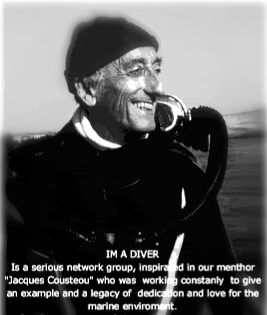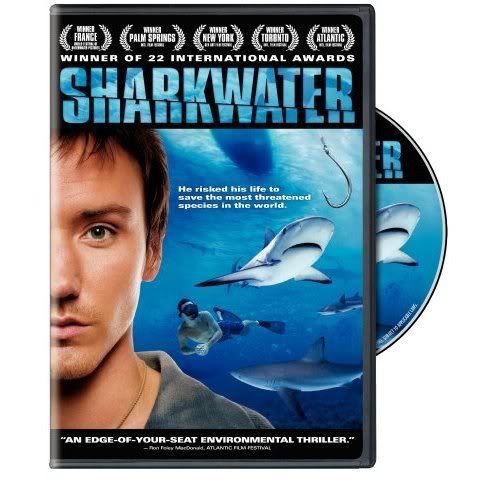
Either it be incidentally, arbitrarily, legal or illegally, the number continues being the same: one hundred million sharks killed every year in the planet. And it also happens in Galápagos!
I have not read about it, no one told me about it; I saw it with my own eyes, I personally gathered the net to take the photo for this article. It was difficult for me to raise it because on it, in it, and through it, hundreds of inert creatures were hanging, trapped. I was following the instructions of Franklin Guaranda, who was trying to obtain the necessary evidence to report to the Galápagos National Park. “Raise the net more”, “Hold it high and don’t move it”, “Twist it a little towards the light”, “Hurry it seems that the fishermen are coming”.
Disciplined as I am, held my breath and my tears. Never in my life had I seen a shark caught in a fishing net. A small black fin shark, like a little rubber fish, constituted a great part of the weight that I held under my arms.
With the Zodiac we traveled the approximately three hundred meters of net, from one end to the other, both tied to the beach, taking photographs and video. We saw at least three rays caught, agonizing, four inert sharks and, by of course dozens of Mullets also known in Ecuador as Lisas (Mugil sp.) which are the primary target of this type of fishing.
At six thirty in the morning, our passengers were at the top of Bartolomé Island, one of the most visited sites of the islands. From its height of one hundred and fifteen meters, they contemplate the sun illuminating San Salvador to the west, Santa Cruz in the distance, the north beach of Bartolomé with its golden half moon form and to the south… in the south beach… a circle of death, in broad day light.
The guides call to the boat. Giancarlo Toti, Graciela Cevallos, Walter Perez insist on the radio. Even as they are seeing it, they can’t believe it. The captain, Juan Robalino, authorizes a Zodiac, and with camera in hand, our only weapon and instrument of work, we rushed to the reported place. I have lived something similar in two previous occasions. I knew I was at risk of being insulted, as it has happened before, that we would have to be fast in case the fishermen became aggressive, and that we had to protect the camera. But everything came to pass very “civilized”, if the term fits.
Ashamed?
- When the fishermen saw us arrive, they got into their boat and they went to the beach, to gather the net. They watched us, we watched them, we were very close to them, always with our camera in hand, but neither they nor we said a word. I want to think that with their silence they let us know that yes, they were ashamed, if not by the slaughter, then by their stupidity of having done this at this place.
- it is not allowed to fish in a tourist area, and
- No one is allowed to disembark on the beach, and the net was secured in each one its ends to dunes where marine turtles nest, one of the men ran stepping on who knows how many nests while he untied the net. Within the circle, in the water, there were turtles and at least five sea lions that were trapped and could not go anywhere, in addition to pelicans and frigate birds that were waiting to participate of the easy feast.
From the stern of their boat, of not more than ten meters in length, a full net full of Mullet hung under the water. We did not want to board the empty boat since we were less than them, so we could not see if they had caught more small sharks, which according to the detraction of Decree 2130, if caught “incidentally” are allowed to be sold on the mainland.
We cannot deny that in fact they were using a gill net for fishing Mullet. But there are hundreds of areas opened to legally fish mullet. So:
- Why fish in a tourist area which is known for its abundance of small shark, which in fact is the main attraction for the tourists here?
- Were they just there for the Mullet?
- Or were they hoping to “incidentally” catch some other small thing?
That is outside our comprehension. We took photos, video and by all means, we called the Galapagos National Park immediately.
In less than two hours, a boat from the Park arrived at Bartolomé. The fishermen had gotten rid of all the evidence. But we counted on photos, video and our report was signed and ready. The fishing boat was taken to port with the personnel of the Marine Reserve Patrol of the Galápagos National Park and a member of Navy. There the legal procedures will be followed to impose the corresponding sanctions.
The South beach, on which our passengers walked to later that morning, was full of dead Mullet, and pelicans and frigate birds that were finally participating in their much awaited feast. One of the sharks “incidentally” killed was also beached. One of the one hundred million sharks that are killed every year in the world.
Either it be incidentally, arbitrarily, legal or illegally, the number continues being the same:
one hundred millions of SHARKS killed every year in the planet.
And it also happens in Galápagos!














